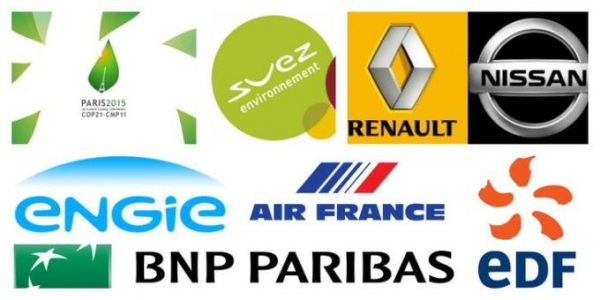Today, Corporate Accountability International released a new report, “Fueling the Fire: The corporate sponsors bankrolling COP21,” exposing the filthy track record of the corporations sponsoring the Paris climate talks. With less than one week before the 21st Conference of the Parties (COP21) of the climate treaty, the report pulls back the green veil of four of the meeting’s dirtiest sponsors.
“Fueling the Fire” focuses on the environmental destruction and public policy interference of the leading COP21 sponsors including fossil fuel conglomerates Engie (formerly GDF Suez) and Suez Environnement, as well as global banking giant BNP Paribas and French utility Électricité de France (EDF). By detailing the corporations’ abuses to the environment and aggressive lobbying to undermine environmental policy, the report lays bare the conflict of interest inherent in allowing such sponsorship to exist.
“Inviting some of the world's biggest polluters to pay for the COP is akin to hiring a fox to guard a hen house," said Patti Lynn, executive director ofCorporate Accountability International. "We must eliminate this conflict of interest before COPs become corporate tradeshows for false market-based solutions.”
As the report details, COP sponsors have long track records of policy interference that contradict the green PR they advance. For example, while EDF claims to be “committed to a decarbonized world,” it is an active member—alongside ExxonMobil and Shell—of BusinessEurope. On behalf of its members, BusinessEurope, which is a reliable obstructionist of European climate policy, openly opposes the “market deployment of energy produced from renewable sources.”
In addition to anti-climate policy interference, the report exposes the reality behind the green façade advanced by the COP sponsors. Engie, an early sponsor of COP21, is a polluter with few rivals. In 2014, the corporation was directly responsible for more than 131 megatons of greenhouse gas emissions, equivalent to the pollution emitted from driving around the globe 12 million times.
“In Nigeria, the deadly effects of Shell’s unholy alliance with our government has left deep scars on our country.” said Philip Jakpor from Environmental Rights Action/Friends of the Earth Nigeria, a member of the global coalition, “Whether it’s sponsorship or back-door lobbying, we must protect climate policy making from those who wish to undermine it.”
Corporate sponsorship of the treaty meetings is just one example of the many ways in which corporate cooptation of and interference in climate policy has become commonplace. In both the UN Framework Convention on Climate Change (UNFCCC) and in national governments, the fossil fuel industry has inserted itself as a stakeholder in the process in order to drive policymakers toward industry friendly “solutions” and delay or water down policy.
The Lima-Paris Action Agenda (LPAA), a joint project of the Peruvian and French COP presidencies, the Office of the Secretary-General of the United Nations and, the UNFCCC Secretariat, is a series of commitments and initiatives involving more than 1,700 corporations including Shell, Total, ExxonMobil and other big polluters. In Paris, the Secretariat will make the LPAA a primary focus, even folding it into the agenda and formal outcomes of the talks. The project’s “open-door” policy has welcomed the participation of not only the world’s largest fossil fuel corporations, but also corporations involved in coal mining and hydraulic fracturing or “fracking” as well transnational energy utilities.
In May, more than 60 organizations launched a global campaign to kick big polluters out of climate policy. To date, more than half a million people have called for the implementation of existing legal precedents to protect climate policy from the interference of the emissions-intensive industries. The coalition will deliver these demands to the Parties in Paris in a week’s time.


 Imagine going to the polls on Election Day and discovering that your ballot could be collected and reviewed by the
Imagine going to the polls on Election Day and discovering that your ballot could be collected and reviewed by the ACLU Blueprints Offer Vision to Cut US Incarceration Rate in Half by Prioritizing 'People Over Prisons'
ACLU Blueprints Offer Vision to Cut US Incarceration Rate in Half by Prioritizing 'People Over Prisons'  "These disasters drag into the light exactly who is already being thrown away," notes Naomi Klein
"These disasters drag into the light exactly who is already being thrown away," notes Naomi Klein  How about some good news? Kansas Democratic Representative advances bill for Native Peoples.
How about some good news? Kansas Democratic Representative advances bill for Native Peoples.  What mattered was that he showed up — that he put himself in front of the people whose opinions on
What mattered was that he showed up — that he put himself in front of the people whose opinions on On a night of Democratic victories, one of the most significant wins came in Virginia, where the party held onto
On a night of Democratic victories, one of the most significant wins came in Virginia, where the party held onto A seismic political battle that could send shockwaves all the way to the White House was launched last week in
A seismic political battle that could send shockwaves all the way to the White House was launched last week in In an interview with Reuters conducted a month after he took office, Donald Trump asserted that the U.S. had “fallen
In an interview with Reuters conducted a month after he took office, Donald Trump asserted that the U.S. had “fallen Attorney General Jeff Sessions overturned the sweeping criminal charging policy of former attorney general Eric H. Holder Jr. and directed
Attorney General Jeff Sessions overturned the sweeping criminal charging policy of former attorney general Eric H. Holder Jr. and directed